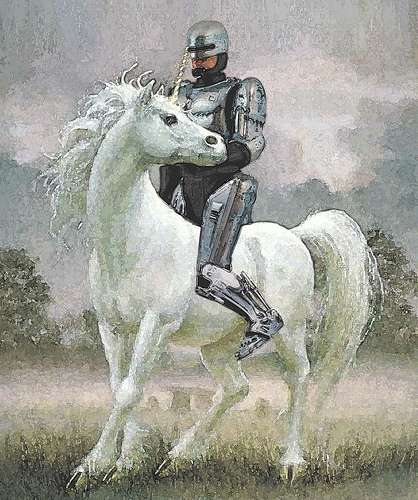I’m having a discussion in another forum. One angle that factored in is what “the average joe” thinks of when they think of generic fantasy. Ya’ll aren’t average Joes but you’ll do in a pinch. So, if someone asserts that X is generic fantasy what kinds of elements would you assume you’d find there?
The only thing I’d really definitely expect is a whole lot of white people swingin’ swords in a world roughly based on western Europe. Magic isn’t necessarily a given.
Tolkien.
Next!
Fighting, magic, swords, and trees all appearing in a created world that’s not our own. That’s pretty much all that I can say is genuinely shared across generic fantasy.
There’s a lot of super-typical elements – prophecies, dragons, magic jewelry, gods, elves, dwarves – but probably anyone here can think of unquestionably generic fantasies that lack those elements.
Elves, Orc/Ogre green-type things, castles and knights, a wizard with a staff and pointy hat, Dragons.
What’s a generic fantasy without magic? Martin has magic, and that was the most “mundane” generic one I could think of.
Keep 'em coming. Except you, Zylon! Out of the pool!
I consider anything with easily recognizable races with magic. You might only have humans, or you might have elves, dwarves, orcs and etc… Basically you know what to expect from the setting although you might know the details of the story. If you are right, then its generic fantasy.
If however, the elves are industrial, do not live in forests, but chop them down to build machines of destruction then it might not be generic fantasy at this point. So it is not just a matter of the standard setting, but also of the standard genotypes for lack of a better term.
D&D forgotten realms.
And here I was expecting cheerleaders, threesomes, and the pool boy.
Fictional Medieval World/Tolkien knockoff = Generic Fantasy
Fictional Victorian World/Steamworks = Steampunk
Fictional Dystopian World/Hackers = Cyberpunk
Pfft. I already gave the real answer. Everyone else is just belaboring the point.
Dude, I thought this was going to be a different kind of fantasy. Orcs and elves. You fucking guys.
Farmboy with magical older mentor has adventures and ends up being king and marrying the princess.
When Gary Gygax died one obituary writer said that he did more than any other person to turn “fantasy” into a stock, generic setting, and I have to agree with that. You could list the stock motifs all day, but anything that appears in 1st edition AD&D is probably generic.
Moreover:
the Tolkien races
substitutes for the Tolkien races
expansions upon the Tolkien races (e.g., fifteen different kinds of dwarves)
the Tolkien races with their characteristics mixed up (e.g., dwarves like trees and elves like to be underground)
dark lords
artifacts that must be destroyed, saved, painted purple
wizards
barbarians
thieves
dragons
Fellowships
Round Tables
apprentices of any variety thrust into adult circumstances
magic swords
runes
people riding on magic mounts
any little evil people
any little good people
any little other people
any kind of symmetrical magic systems, dark vs. light, law vs. chaos, etc.
pseudo-Vikings
pseudo-Mongols
pseudo-Romans
That didn’t happen in the Riftwar Saga!
Or Star Wars.
Anyway, when I think of “generic fantasy,” the first things that come to mind are:
- Swords
- Sorcery
- Elves (usually of at least three varieties (e.g. High Elf, Wood Elf, Dark Elf))
- Dwarves
- Possibly dragons
- Pseudo-medieval trappings
- Ancient evil that seeks to destroy the world
- Often some sort of hero’s quest/destiny fulfillment thing
Tolkien is not generic. The large sub-genre of people copying Tolkien have become generic, but I think it’s an important distinction.
Absolutely. The “generic fantasy” genre did not exist when Tolkien wrote.
